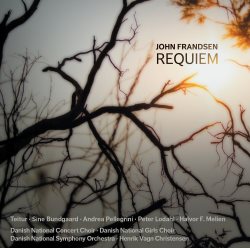| 
|
John FRANDSEN (b. 1956)
Requiem (2010) [96:26]
Teitur (vocal), Sine Bundgaard (soprano), Andrea Pellegrini (alto), Peter Lodahl (tenor). Halvor F. Meilen (bass)
Danish National Symphony Orchestra and Choirs/Henrik Vagn Christensen
rec. 3-6 April 2013, DR Koncerthuset
DACAPO SACD 6.220649-50 [62:27 + 34:03]
This is a world première recording of Danish composer John Frandsen’s Requiem for soloists, choir and orchestra. It is a complete setting of the entire Medieval Latin text, with the addition of solo hymns set to more recent Danish words. All texts plus translations into English are provided in the booklet. The composer has dedicated his requiem to the victims of the tragedy on the Norwegian island of Utøya in 2011, though since the work was completed before this event no claim is made for it as a direct response.
Described as ‘operatic’, this is certainly an atmospheric and colourful work, taking the concept of a Requiem beyond the objective ... and engaging with the tragic worlds created by Benjamin Britten in his War Requiem. The opening Introit sets a promisingly inventive emotional scene with disturbing percussion effects including downward tubular bell glissandi made by moving the tube upwards out of a bucket of water. Dramatic and expressive vocal solo and ensemble writing, the full orchestra and choral interjections all add to the sense of grand dimensions and an ambitious palette. This given, there is a fragmentary feel to the music which seems to look downward into detail rather than allowing a feel of real flow and elevation.
There are a number of Hymn movements, expertly accompanied by Per Salo on organ and sung by popular singer Teitur, full name Teitur Lassen. These settings deliver a more up-to-date feel to the contemporary texts by Simon Grotrian, but the close-miked perspective and dolorous Rufus Wainwright feel to Teitur’s voice is an extreme and uneasy contrast with the rest of the work. My instinct if revising the work would be to remove these altogether or have them as a separate cycle.
There is no escaping the eclectic nature of this Requiem, with little bits of Penderecki-style dramatic choral crowds, Carl Orff-like moments, Messiaen-like bits and even a Martinu moment at 1:48 into the Lacrymosa dies illa, followed by some nice Tippett-like string writing. Frandsen is, to my mind, most effective when he leaves aside the biggest orchestral effects, and the tenderness in some of this Lacrymosa has the potential for real loveliness. The a capella opening to Judex ergo cum sedebit earlier on also has some striking moments, but Frandsen doesn’t allow any real ecstasy to loosen the floodgates of our emotions or genuine strangeness to tease our intellects. He has his Mahler moment in the Pie Jesu, Domine, but we are never permitted any really expressive lines or time to develop an inner emotional dialogue.
This is an impressive work, given a highly effective performance and a stunning recording. Its message will have a wide appeal but I have the feeling the music itself, being tricky to shelve in any straightforward category, may have problems taking on a life of its own. It is tough at times but never hard-hitting enough to stop the traffic. It has beauty, but no movements which are likely to be chosen as a tear-jerker at the movies or for documentaries. We get close in the gentle Lux aeterna but this remains a restless romanticism with its feet on ground which is uncertain and resistant to the genuine germination and nurture of its best ideas. As a Requiem this is not plain-speaking enough to stand alongside the likes of Fauré or Duruflé, nor is it avant-garde enough to be placed with someone like Ligeti. Part of the problem is outlined in the booklet notes, which hold the work up as having found “a new intensity … that meets the present listener halfway” - two elements which surely pull in opposite directions. I don’t want to be met halfway in a Requiem. I want it to take me in whichever direction as far as a piece of music can on that emotional journey, not something which can superficially be rationalised as encapsulating “the unity of the classical and the modernist,” which finds “a new path into the ancient text” but doesn’t have the power or gravitas of its own convictions to escape a shopping list of influences and associations. There is plenty of pace, drama and eloquence here, but for me this is more ‘oratorio’ than ‘requiem’. It sounds cruel to say it, but if you close your eyes and use a little imagination it wouldn’t be too much trouble to substitute the words with some other libretto. I doubt the impact of the music would change hugely as a result.
I would be less critical, but a Requiem is a real opportunity for music to serve a purpose – that for the listener to lose themselves in an emotional connection with memory, reflection on the mortality of ourselves and those we love, discovery of inner places never before visited and a feeling of companionship with the extended family of the human race. Plaudits are richly deserved for the artists involved and for the pioneering publication policy of the DaCapo label with this release. I really wanted to love this remarkable production and be able to sing its praises as eloquently as its soloists sing its texts. In a work which has compositionally had everything thrown at it bar the kitchen sink this has ultimately lost the struggle to find a connection.
Dominy Clements
 |
 |
|



 All Nimbus reviews
All Nimbus reviews








